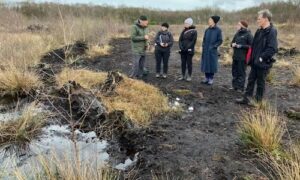Learning from the past, looking to the future with peatland communities
 Lindow Moss, a raised peat bog on the edge of Wilmslow, is known for being the home of Britain’s most famous bog body, Lindow Man. However, until recently, the sprawling wetland located in the heart of a suburban area was largely neglected.
Lindow Moss, a raised peat bog on the edge of Wilmslow, is known for being the home of Britain’s most famous bog body, Lindow Man. However, until recently, the sprawling wetland located in the heart of a suburban area was largely neglected.
Learning from the past, looking to the future with peatland communities was a project led by Professor Melanie Giles from the University of Manchester’s School of Arts, Languages and Cultures, which aimed to engage local communities living in and around Lindow Moss to restore the old peatlands. The project was funded by the University’s Humanities Strategic Civic Engagement Fund (HSCEF), the Faculty of Humanities’ flagship social responsibility funding scheme. The scheme supports projects inspired by the University’s Greater Manchester location that aim to improve communities across the city-region.
As an archaeologist, making the past matter was one of Melanie’s main aims for her project. She collaborated with local community groups, heritage practitioners, charitable organisations and other academics to maximise the cultural heritage of the Moss, re-enchant the local people with the wetland habitat on their doorstep and feed into a wider sense of care and respect for the peatlands.
The project team also recognised the power of the peatlands in addressing the issue of climate change. As carbon sumps, every time a peat is cut, stored carbon is re-released. By helping to restore them, that carbon can instead be sequestered, limiting the amount released into the atmosphere.
Using the funding from the HSCEF, Melanie and her team were able to deliver a range of engagement events to generate support and interest in the restoration project. They brought the local and academic communities together for a workshop, hosted a conference which brought curators up from the British Museum, worked with local artists to create new visions of the bog and developed continuing partnerships with local schools.
Despite the project having come to an end, Melanie describes it as having “opened a door” between her and the Lindow Moss community, with whom she has an ongoing relationship: “The University’s commitment to its local communities has rubbed off on me. It has been intensely rewarding to work with the communities on the doorstep; it gave them a sense of belonging and opened conversations about the past.”
Today, with the support of her wider project team, the community and organisations across Manchester, Melanie’s project continues to thrive, now a hub of ongoing civic engagement with peatlands.
Discussing the impact of the project, Melanie said: “In the research world, I think it’s incumbent upon us to make sure that what we do is as useful as possible and that can be in this wonderful, creative, joyous way. That is one of the bits that’s brought me most pleasure, watching other people take some of your ideas and turn them into something beautiful and engaging.”
- To find out more, visit the Lindow Moss community website.
- Find out more about the University of Manchester’s Humanities Strategic Civic Engagement Fund.
